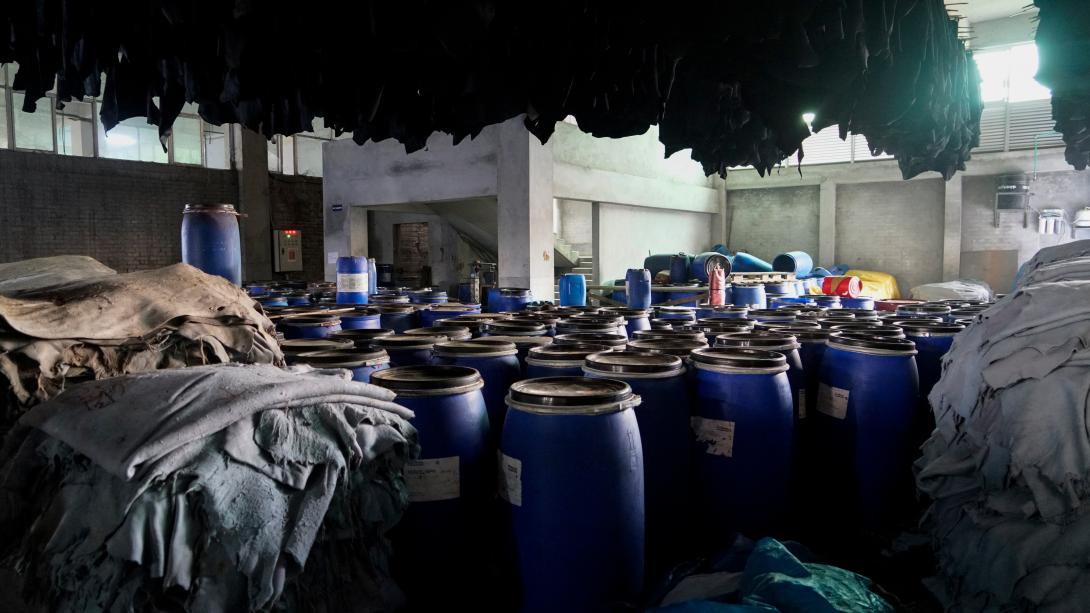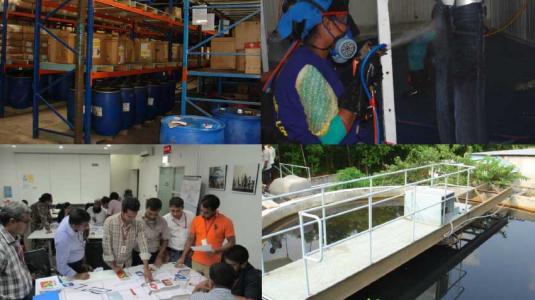e-REMC - Chemical Management Training

© GIZ/Linh Nguyen
The e-REMC self-learning program, developed under Promoting Sustainability in the Textile and Garment Industry in Asia (FABRIC), offers eleven modules aligned with the REMC handbook, focusing on chemical management in textile, leather, and synthetic shoe industries. Tailored for technical professionals, it promotes self-paced learning with voiceover presentations, quizzes, and comprehensive knowledge on sustainable chemical management. The course targets diverse roles, fostering awareness of health and environmental risks and ensuring compliance with international standards.
Availability
Currently, the training is available in English, Bengali, Mandarin, Turkish and Urdu on the Atingi platform, with plans to expand to additional languages in the future. Access to the training is provided free of charge, ensuring widespread availability.
Main features and components
The e-REMC self-learning program consists of eleven topic-specific self-learning modules, of which eight are further subdivided into submodules called learning units. The topics and structure of the modules are aligned with the content and outline of the REMC company handbook. The self-learning materials also include several additional CM related topics which have not been part of the REMC toolkit. Each self-learning module consists of two components, including (1) a presentation with voiceover audio/text plus links to further reading materials on Slide 3 and (2) quizzes to self-test the learning comprehension. All presentations contain voiceover explanations with available accompanying text. Learners can proceed with the presentations at their own speed, controlling the movement and changes of individual slides. This allows learners sufficient time to reflect on and digest the contents. The quizzes help to reflect on learning progress as well as recall the key takeaway messages from each module.
Who is this course for?
The self-paced interactive web-based training is directed to different target groups such as individual participants like technical engineers, shift leaders, middle management with technical background from textile, leather and synthetic (in particular PU) shoe factories mostly comprising of small- and medium-scale enterprises (main beneficiaries).
It is directed to employees with technical background in procurement, transport, storage, production, finishing (souring, bleaching, dyeing, printing), packaging and confectioning.
Other individual learners might be top management as well as buying agents and brands representatives of sourcing or design departments as well as authorities, multipliers and suppliers.
Key Learning Objectives:
- Increase awareness of health and environmental risks associated with chemical use in textile, leather, and synthetic shoe manufacturing.
- Support the adoption of sustainable chemical management practices to minimize negative impacts on the environment and worker health.
Training Outcomes:
- Understand the importance of Chemical Management (CM).
- Acquire comprehensive knowledge of CM approaches, requirements, and methods.
- Develop the ability to enhance chemical management within factories/facilities.
- Establish or improve a consistent management system for chemical management.
Practical Skills Gained:
- Apply the DEMINMG cycle systematically for continuous improvement.
- Assess and evaluate current processes.
- Develop effective Management Action Plans (MAPs).
Regulatory Compliance:
- Navigate complex regulation and compliance frameworks.
- Implement chemical management in line with international requirements:
- ISO standards (ISO 9001, ISO 14001, ISO 45001).
- Zero Discharge of Hazardous Chemicals (ZDHC).
- Strategic Approach to International Chemicals Management (SAICM).
- Pollutant Release and Transfer Registers (PRTRs).
- Greenpeace (DETOX).
- Restricted- and Manufacturer Restricted Substances Lists (RSL/MRSL).
- ILO Convention 170 on safety in the use of chemicals at work.
How much time you need to invest: It takes you around 13 hours to complete the course
Course Certificate: After successful completion you will be rewarded with a certificate
Course Developer: The full training approach e-REMC was developed with the Berlin University of Applied Sciences (BHT) and adelphi pvt. Ltd. on behalf of the Deutsche Gesellschaft für Internationale Zusammenarbeit (GIZ) GmbH.
Course Contact: Gundolf.Klaehn@giz.de
Characteristics
Regions
Global
